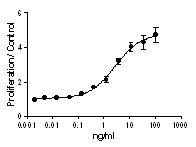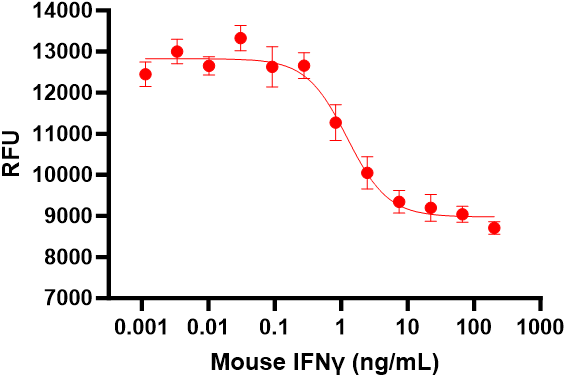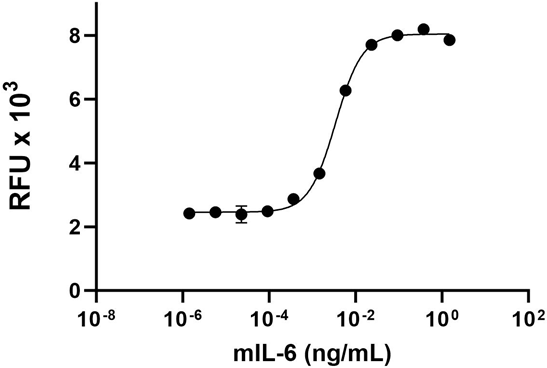- Regulatory Status
- RUO
- Other Names
- Cytokine synthesis inhibitory factor (CSIF)
- Ave. Rating
- Submit a Review
- Product Citations
- publications
IL-10 was first described as a cytokine that is produced by T helper 2 (Th2) cell clones. It inhibits interferon (IFN)-g synthesis in Th1 cell, and therefore it was initially called cytokine synthesis inhibiting factor (CSIF). Macrophages are the main source of IL-10 and its secretion can be stimulated by endotoxin (via Toll-like receptor 4, NF-κB dependent), tumor necrosis factor TNF-α (via TNF receptor p55, NF-kB-dependent), catecholamines, and IL-1. IL-10 controls inflammatory processes by suppressing the expression of proinflammatory cytokines, chemokines, adhesion molecules, as well as antigen-presenting and costimulatory molecules in monocytes/macrophages, neutrophils, and T cells. IL-10 inhibits the production of proinflammatory mediators by monocytes and macrophages such as endotoxin- and IFN-g-induced release of IL-1a, IL-6, IL-8, G-CSF, GM-CSF, and TNF-a. In addition, it enhances the production of anti-inflammatory mediators such as IL-1RA and soluble TNFα receptors. IL-10 inhibits the capacity of monocytes and macrophages to present antigen to T cells. This is realized by down-regulation of constitutive and IFNγ-induced cell surface levels of MHC class II, of costimulatory molecules such as CD86 and of some adhesion molecules such as CD58.
Product DetailsProduct Details
- Source
- Mouse IL-10, amino acids Ser19-Ser178 (Accession # NM_010548) with a Cys149Tyr substitution, was expressed in E. coli.
- Molecular Mass
- The 161 amino acid N-terminal methionylated recombinant protein has a predicted molecular mass of 18.9 kDa. The DTT-reduced protein migrates at approximately 18kDa and non-reduced protein migrates at approximately 15kDa by SDS-PAGE.
- Purity
- Purity is >98%, as determined by Coomassie stained SDS-PAGE.
- Formulation
- 0.22 µm filtered protein solution is in 20 mM Tris, 150 mM NaCl; pH 7.5.
- Endotoxin Level
- Endotoxin level is <0.1 EU/µg (<0.01ng/µg) protein as determined by the LAL method.
- Concentration
- 10 and 25 µg sizes are bottled at 200 µg/mL. 100 µg size and larger sizes are lot-specific and bottled at the concentration indicated on the vial. To obtain lot-specific concentration and expiration, please enter the lot number in our Certificate of Analysis online tool.
- Storage & Handling
- Unopened vial can be stored between 2°C and 8°C for up to 2 weeks, at -20°C for up to six months, or at -70°C or colder until the expiration date. For maximum results, quick spin vial prior to opening. The protein can be aliquoted and stored at -20°C or colder. Stock solutions can also be prepared at 50 - 100 µg/mL in appropriate sterile buffer, carrier protein such as 0.2 - 1% BSA or HSA can be added when preparing the stock solution. Aliquots can be stored between 2°C and 8°C for up to one week and stored at -20°C or colder for up to 3 months. Avoid repeated freeze/thaw cycles.
- Activity
- ED50 = 0.1- 0.5 ng/ml, corresponding to a specific activity of 2- 10 x 106 units/mg, as determined by the dose dependent stimulation MC/9 cell proliferation.
- Application
-
Bioassay
- Application Notes
-
BioLegend carrier-free recombinant proteins provided in liquid format are shipped on blue-ice. Our comparison testing data indicates that when handled and stored as recommended, the liquid format has equal or better stability and shelf-life compared to commercially available lyophilized proteins after reconstitution. Our liquid proteins are verified in-house to maintain activity after shipping on blue ice and are backed by our 100% satisfaction guarantee. If you have any concerns, contact us at tech@biolegend.com.
- Application References
- Product Citations
-
Antigen Details
- Distribution
-
IL-10 is produce by Th2 cells, macrophages, DCs, B cells, CD8+ T cells, regulatory T cells (Tregs), Th1 cells and Th17 cells. In addition, IL-10 is expressed by monocytes, B cells, eosinophils, and mast cells.
- Function
- IL-10 is an immunoregulatory cytokine. Its main function is the limitation and termination of inflammatory responses and the regulation of differentiation and proliferation of several immune cells such as T cells, B cells, natural killer cells, antigen-presenting cells, mast cells, and granulocytes.
- Interaction
- IL-10R is expressed in monocytes, NK, B and T cells. In addition Langerhans cells, dermal dendritic cells, eosinophils, mast cells, and endothelial cells can respond to IL-10.
- Ligand/Receptor
- IL-10 binds to their receptors IL-10R1 and IL-10R2, and initiates a STAT3-dependent signaling cascade.
- Biology Area
- Immunology
- Molecular Family
- Cytokines/Chemokines
- Antigen References
-
1. Fiorentino DF, et al. J. Exp. Med. 170:2081-2095 1989.
2. Ho AS, et al. P. Natl. Acad. Sci. USA 90:11267-11271 1993.
3. Hart PH, et al. J. Immunol. 157:3672-3680 1996.
4. Asadullah K, et al. Pharmacol Rev 55:241-269 2003.
5. Mosser DM and Zhang X Immunol. Rev. 226:205-218 2008.
6. Maynard CL and Weaver CT Immunol. Rev. 226:219-233 2008. - Gene ID
- 16153 View all products for this Gene ID
- UniProt
- View information about IL-10 on UniProt.org
Related FAQs
- Why choose BioLegend recombinant proteins?
-
• Each lot of product is quality-tested for bioactivity as indicated on the data sheet.
• Greater than 95% Purity or higher, tested on every lot of product.
• 100% Satisfaction Guarantee for quality performance, stability, and consistency.
• Ready-to-use liquid format saves time and reduces challenges associated with reconstitution.
• Bulk and customization available. Contact us.
• Learn more about our Recombinant Proteins. - How does the activity of your recombinant proteins compare to competitors?
-
We quality control each and every lot of recombinant protein. Not only do we check its bioactivity, but we also compare it against other commercially available recombinant proteins. We make sure each recombinant protein’s activity is at least as good as or better than the competition’s. In order to provide you with the best possible product, we ensure that our testing process is rigorous and thorough. If you’re curious and eager to make the switch to BioLegend recombinants, contact your sales representative today!
- What is the specific activity or ED50 of my recombinant protein?
-
The specific activity range of the protein is indicated on the product datasheets. Because the exact activity values on a per unit basis can largely fluctuate depending on a number of factors, including the nature of the assay, cell density, age of cells/passage number, culture media used, and end user technique, the specific activity is best defined as a range and we guarantee the specific activity of all our lots will be within the range indicated on the datasheet. Please note this only applies to recombinants labeled for use in bioassays. ELISA standard recombinant proteins are not recommended for bioassay usage as they are not tested for these applications.
- Have your recombinants been tested for stability?
-
Our testing shows that the recombinant proteins are able to withstand room temperature for a week without losing activity. In addition the recombinant proteins were also found to withstand four cycles of freeze and thaw without losing activity.
- Does specific activity of a recombinant protein vary between lots?
-
Specific activity will vary for each lot and for the type of experiment that is done to validate it, but all passed lots will have activity within the established ED50 range for the product and we guarantee that our products will have lot-to-lot consistency. Please conduct an experiment-specific validation to find the optimal ED50 for your system.
- How do you convert activity as an ED50 in ng/ml to a specific activity in Units/mg?
-
Use formula Specific activity (Units/mg) = 10^6/ ED50 (ng/mL)

 Login / Register
Login / Register 














Follow Us